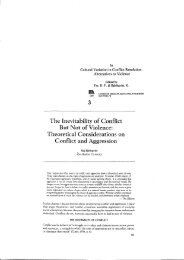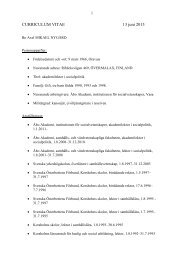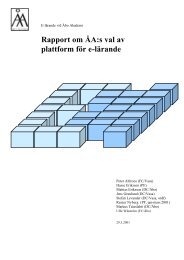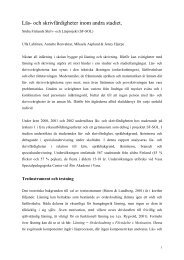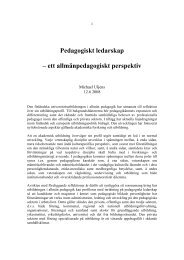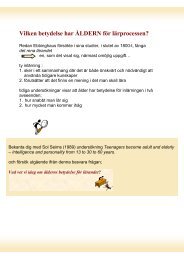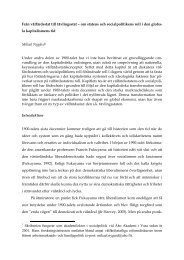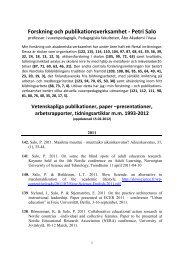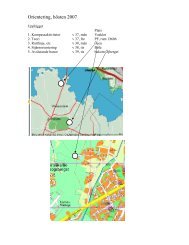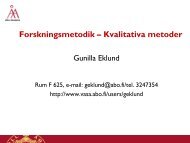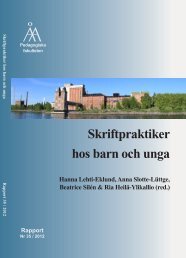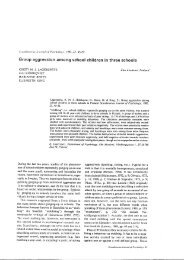Parties, Candidates and Citizens On-Line - Åbo Akademi
Parties, Candidates and Citizens On-Line - Åbo Akademi
Parties, Candidates and Citizens On-Line - Åbo Akademi
Create successful ePaper yourself
Turn your PDF publications into a flip-book with our unique Google optimized e-Paper software.
Finnish voters’ propensity to look for on-line election information, visit party/c<strong>and</strong>idate<br />
websites or c<strong>and</strong>idate selectors were predicted in these analyses. The findings firstly<br />
showed that when access to the technological resources are equal, citizens aged 18-34<br />
appear more prone to visit political websites for finding information than older citizens<br />
(cf. Boogers & Voerman 2003, 25). It should also be noted that the c<strong>and</strong>idate selectors<br />
provided by the news media also attracted middle-aged (35-49) voters. In conjunction<br />
with Norris’ finding (1999, 85) this generational effect lends some support to the<br />
mobilization argument. Secondly, <strong>and</strong> also on a positive note, neither class nor income,<br />
two demographic characteristics often associated with traditional political activity, proved<br />
significant predictors of seeking <strong>and</strong> placing emphasis in on-line political information.<br />
Thirdly, however, the analysis mostly revealed socio-economic patterns similar to those<br />
found in traditional political activity, interest <strong>and</strong> engagement (cf. Norris 1999, 87; 2001,<br />
91-92); the voters looking for political information on-line <strong>and</strong> visiting party or c<strong>and</strong>idate<br />
websites showed an overrepresentation towards males, the highly educated, <strong>and</strong> citizens<br />
living in urban or semi-urban milieus. The patterns were the same for those visiting<br />
c<strong>and</strong>idate selectors, with the exception of gender having no significant effect.<br />
Nonetheless, these latter findings support the reinforcement theory.<br />
In regards to the impact of the web-based sources for election-related information<br />
on the voters prior to the 2004 EP- election, the findings of the second article also mostly<br />
support the reinforcement theory, but to some degree, also maintain the potential for<br />
mobilization. The analysis showed that Finnish voters in general do not place great<br />
importance on web-based information sources, i.e. party or c<strong>and</strong>idate websites or<br />
c<strong>and</strong>idate selectors on media websites (only 6%, 9% <strong>and</strong> 14% respectively), when making<br />
their voting decision. Traditional information sources, such as television news <strong>and</strong> current<br />
affairs programmes, <strong>and</strong> newspaper stories, still have a larger impact (28% <strong>and</strong> 26%<br />
respectively). For the youngest voters (ages 18-24) the picture is, however, the opposite.<br />
These voters deem the web-based sources more important than traditional information<br />
sources in forming their voting decision (cf. Lusoli 2005b, 154-156). Nonetheless, the<br />
results of regression models predicting the kind of voters who deemed the web-based<br />
sources as quite- or very much important in making their voting decisions revealed<br />
findings similar to those regarding voters looking for political information or visiting<br />
political websites on-line. The logistic regression model showed that, alongside being<br />
young, living in an urban context had a significant positive effect on placing greater<br />
importance in web-based sources in influencing citizens’ voting decisions.<br />
Considered together, there is generally strong support for the reinforcement<br />
theory in the findings of the second article. The Finnish population, as a whole, are<br />
neither turning to the internet for election-related information nor placing significant<br />
importance in such information when forming their voting decisions. Some of the socio-<br />
177



